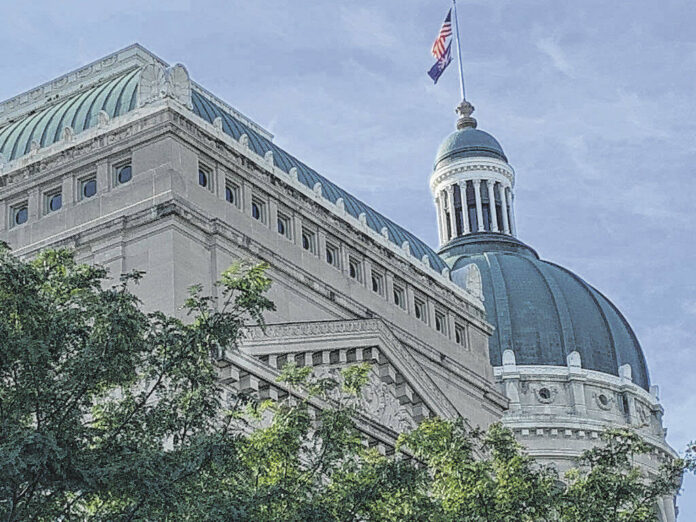Republican and Democrat strategists alike are buckling down in the final weeks before Election Day, targeting competitive races in the House Chamber with the hopes of growing their parties’ influence at the Statehouse.
Similar to the Senate, Republicans identified several House Democrat seats they’ve targeted to flip but, unlike the other chamber, Democrats seem focused on offense as well.
Republicans take aim at Democratic incumbents
Matt Huckleby, the executive director of the Indiana Republican Party, suggested that a handful of seats were no longer safely Democratic, including ones in southern and central Indiana.
“The environment is better for us,” Huckleby said. “I feel pretty confident (about keeping the chamber supermajority). Our candidates are taking every race seriously and working their tails off – some of them are working harder than they ever have.”
Republicans hold 71 seats to Democrats’ 29, meaning the caucus can conduct its business without input or even participation from the Democrats. To break that supermajority in the House, Democrats would need to pick up five seats.
But Huckleby believes Republicans can grow that number, pointing to Republican Scott Hawkins, a public school teacher, challenging incumbent Democrat Rita Flemings, a retired OB-GYN, in District 71.
Hawkins received $40,000 from the House Republican Campaign Committee while Fleming, who has held the Jeffersonville district for four years, was one of two Democrats to get a contribution, for $10,000, from the Democratic House Committee.
“I’m excited about (Hawkins’) race and think he has a good shot,” Huckleby said.
Another competitive contender to Huckleby would be Rep. Terri Austin, a Democrat who represents Anderson, who will face Republican Kyle Pierce in November.
“There are others we’re following and keeping a real close eye on,” Huckleby said.
In a newly created District 82 in Fort Wayne, chances are Democrats will be the winner but Huckleby said his party fielded a good candidate, Davyd Jones.
“The Fort Wayne seat isn’t a slam dunk for us,” Huckleby said. “Jones has really impressed us but we’re looking at a very competitive race there.”
Democrats target seats in the doughnut counties
In the areas surrounding Indianapolis, the “doughnut counties,” Democrats have their eyes on several races they believe could erode away the Republican supermajority in the House Chamber.
Mike Schmuhl, the chair of the Indiana Democratic Party, said that pickup opportunities weren’t limited to central Indiana but, in particular, highlighted four races he said were very competitive:
Democrat Victoria Garcia Wilburn versus Republican Fred Glynn in House District 32
Democrat Matt McNally versus Republican incumbent Jerry Torr in District 39
Democrat Jen Bass-Patino versus Republican Becky Cash in District 25
Democrat Joellyn “Joey” Mayer versus Republican incumbent Donna Schaibley in District 24
“Those four races I think are really competitive and potential pickup opportunities for us,” Schmuhl said. “That’s really the fastest, most-changing terrain in Indiana over the last few years… All of those folks are just fantastic candidates, impressive people.”
District 32 hugs the Hamilton County side of the Marion County border, with a sliver in Marion County, and District 39 sits above it. District 25 covers parts of Boone and Hendricks Counties while District 24 is split between Hamilton and Boone Counties.
Abortion’s role in the election
In the races against Glynn and Torr, Schmuhl anticipated that abortion would play a large role. He said that Torr’s vote to ban the reproductive healthcare procedure put him “out of touch with his constituents” and the Democrats observed that Glynn removed references to abortion from his website following his primary election.
“What you’ve seen in these races… is the Republican candidates backtracking or hiding from their stances on that issue,” Schmuhl said. “I think it shows that this issue is a loser for them and they don’t want to talk about it; they don’t want to address it.”
But Huckleby said he believes the political winds are in his party’s favor, citing recent national polling that reported economic concerns outweighed abortion fervor.
“People across the country, and even more so in Indiana, are focused on inflation and economic security,” Huckleby said. “Voters trust Republicans on these issues.”
As with the Senate, many aspiring Republican lawmakers didn’t respond to Indiana Right to Life’s survey, as detailed in its voter guide, especially candidates challenging Democrats in tough districts.
But some candidates in safer districts were inclined to respond, including Lorissa Sweet in northeastern Indiana and Julie McGuire in southern Indianapolis. Both won a “supports pro-life legislation” designation from the organization.
McGuire received the largest sum of money from the House Republican Campaign Committee, $532,000, but the bulk of that spending came during the primary election when she defeated incumbent GOP Rep. John Jacob.
This story by Whitney Downard is republished from The Indiana Capital Chronicle, an independent, nonprofit news organization that covers state government, policy and elections.





